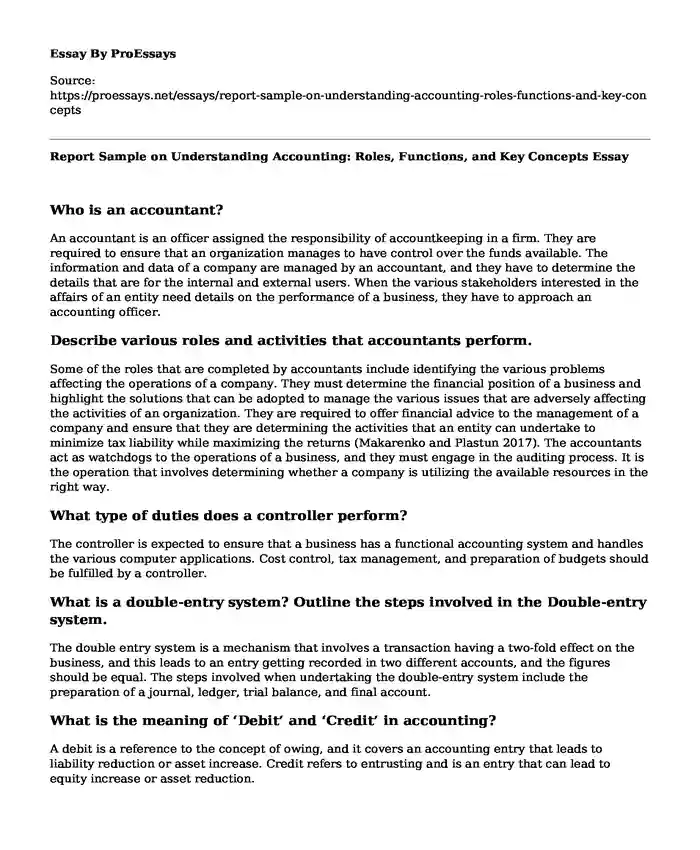Who is an accountant?
An accountant is an officer assigned the responsibility of accountkeeping in a firm. They are required to ensure that an organization manages to have control over the funds available. The information and data of a company are managed by an accountant, and they have to determine the details that are for the internal and external users. When the various stakeholders interested in the affairs of an entity need details on the performance of a business, they have to approach an accounting officer.
Describe various roles and activities that accountants perform.
Some of the roles that are completed by accountants include identifying the various problems affecting the operations of a company. They must determine the financial position of a business and highlight the solutions that can be adopted to manage the various issues that are adversely affecting the activities of an organization. They are required to offer financial advice to the management of a company and ensure that they are determining the activities that an entity can undertake to minimize tax liability while maximizing the returns (Makarenko and Plastun 2017). The accountants act as watchdogs to the operations of a business, and they must engage in the auditing process. It is the operation that involves determining whether a company is utilizing the available resources in the right way.
What type of duties does a controller perform?
The controller is expected to ensure that a business has a functional accounting system and handles the various computer applications. Cost control, tax management, and preparation of budgets should be fulfilled by a controller.
What is a double-entry system? Outline the steps involved in the Double-entry system.
The double entry system is a mechanism that involves a transaction having a two-fold effect on the business, and this leads to an entry getting recorded in two different accounts, and the figures should be equal. The steps involved when undertaking the double-entry system include the preparation of a journal, ledger, trial balance, and final account.
What is the meaning of ‘Debit’ and ‘Credit’ in accounting?
A debit is a reference to the concept of owing, and it covers an accounting entry that leads to liability reduction or asset increase. Credit refers to entrusting and is an entry that can lead to equity increase or asset reduction.
What is meant by ‘Hybrid basis’ accounting? How the entries are recorded using this method?
The hybrid basis of accounting is a mixture of mercantile and cash procedures. There exist instances that entities are made when payments are made in cash Incomes are only recorded when a business has received it, but the incurred experiences are entered into the accounting books even when payments are not made (Secinaro et al., 2019).
What is the difference between ‘Real Accounts’ and ‘Personal Accounts’?
Real accounts are the ones that are used to make records of assets and property, such as machinery, assets, and buildings. They can further be broken into tangible accounts that incorporate the assets that can be touched like motor vehicles. The intangible real accounts are for the goodwill. Personal accounts are the tools that are used to record the transactions completed with a person or a group of people, and they are mainly involved in recording transactions made on credit.
How do we record the entries using the basis accounting method?
Under the cash basis, entries are only made when cash is received or made. When involved in expenditure entries, the outstanding expenses are considered, and their accounts are created with the goal of highlighting the income.
What are the main objectives of bookkeeping? How would you distinguish bookkeeping from accounting?
The bookkeeping objective is to ensure that the business transactions are recorded in a systematic way to ensure that there is a permanent record of every transaction. It helps in ascertaining the financial position of a business. An organization can manage to review the business policies and facilitate the amendment of business laws by the government. Bookkeeping is involved in recording the available transactions in the original books while the accounting process determines their accuracy. Through bookkeeping, the details are created for use in ledger accounts and journals, while the accounting process uses these journals to make a trial balance.
References
Secinaro, S., Brescia, V., Calandra, D. and Chmet, F., 2019. The Popular Financial Reporting for Hybrid Organization: A Solution to A Tricky Accounting Problem. Journal of Accounting and Finance, 19(8). https://doi.org/10.33423/jaf.v19i8.2618
Makarenko, I. and Plastun, A., 2017. The role of accounting in sustainable development. Accounting and Financial Control, 1(2), pp.4-12. http://dx.doi.org/10.21511/afc.01(2).2017.01
Cite this page
Report Sample on Understanding Accounting: Roles, Functions, and Key Concepts. (2023, Dec 28). Retrieved from https://proessays.net/essays/report-sample-on-understanding-accounting-roles-functions-and-key-concepts
If you are the original author of this essay and no longer wish to have it published on the ProEssays website, please click below to request its removal:
- Paper on Investment Issues: Efficient Market Hypothesis Framework
- Essay Example on Trading Options
- Essay Sample on How Superintendents Perceive Fundraising or Unrestricted Donation at the District
- Motivational Factors in Banking - Essay Sample
- Paper Example on Analyzing Conifer Corp: Signs of Trouble?
- Audit: Detecting Fraud & Uncovering Financial Breach - Essay Sample
- Free Report Example on Improving Living Standards Through Adequate Housing







